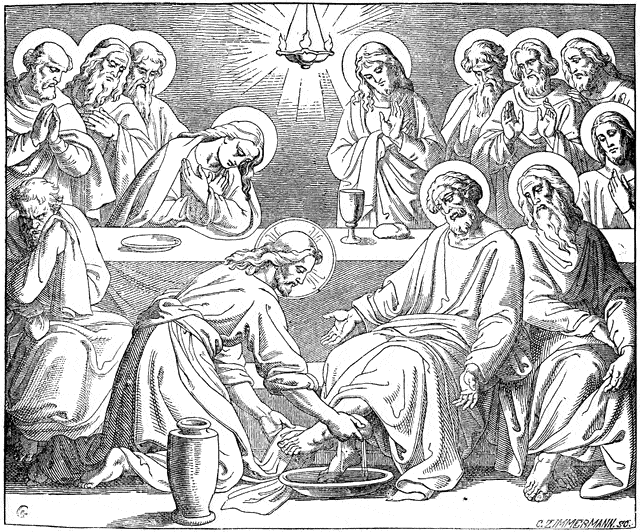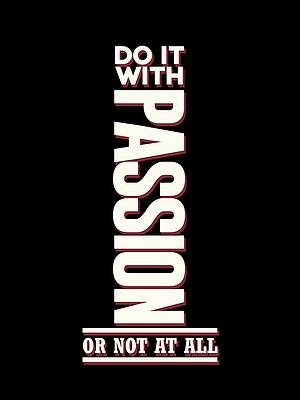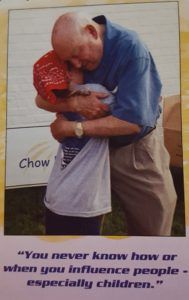
If I am to become the man God wants me to be, I must develop the attribute of teamwork. Teamwork is “cooperative or coordinated effort on the part of a group of persons acting together as a team or in the interests of a common cause.” (www.dictionary.com).
“It takes a true team effort for any group to be successful in any endeavor – a family, a business, a sports team or a community group. When individuals are truly focused on the good of the group or team, they are willing to place their own individual success second to the success of the team. This is what sets apart the greatest, most successful and most enduring teams or groups of all kinds through history. The greatest champions of sports, business, entertainment, politics, and service have humbled themselves and become ‘team players’, working to make their entire unit great. That is true teamwork.
Today, so much attention is given to individual expression and individual performance. Yet experience tells us that the greatest things have been accomplished by a group of individuals working together for a common cause. Those who have the most profound impact on the world and gain the greatest significance in life are those who know that it takes a team working together to achieve. They also know that sharing the reward is also most rewarding. Team players strive to make their entire group great. No team sport athlete wins a championship on his or her own. No business leader is solely responsible for the company’s success. No individual alone carries a group to victory. Groups and teams cannot function properly and healthily without the participation of every member filling his or her role. You are a part of some type of team – whether in a school group, a band, a sports team, a family, or a group on the job. You may not realize it, but the members of your team are looking to you to fill your role and help them reach something greater. How will you respond?
(Heart of a Champion Character Development Program, Teamwork, Volume 3, p.3).
Teamwork is one of the attributes that the Heart of A Champion Character Development Program (http://www.heartofachampion.org/) strives to develop in young people in its outreach program. Their written and video programs approach this under 4 subtopics: Teamwork in a Group Setting, Teamwork in the Family, Teamwork Means Thinking Team 1st, and Teamwork in Trust Relationships. We shall use that same approach in discussing it here. Please consider …
Teamwork in a Group Setting
“We live in a world today that focuses on individual achievement. Yet in reality most great or even good things are accomplished by a group of individuals working together for a common cause. This is true of governments, companies, sports teams, and families. The best of these have learned that the sum of the parts is greater than the whole, and that it takes a group effort to achieve the greatest success. The people in groups with this approach have been able to work together to realize greater things as a unit than they could on their own. Real teammates pull for those around them when they are doing well, encourage them when they are struggling, help them when they are hurting, and speak the truth in love when they’ve done wrong. Be a great teammate for someone else, and you will find that others will help you reach your goals and dreams too. REMEMBER, TOGETHER EVERYON ACHIEVES MORE!”
(Heart of a Champion Character Development Program, Teamwork, Volume 3, p.4).
Chris Paul
“In just a few years, Chris Paul has become one of the NBA’s brightest stars. As a point guard, Chris’ job is to be a leader on the court and to make his teammates better. Chris’ teammates agree that he excels at both. Not only is he known for his tremendous ability and creativity on the court, but also for his commitment to helping others in the community.”
(Heart of a Champion Character Development Program, Teamwork, Volume 3, p.4).
Nicknamed “CP3”, he has won the NBA Rookie of the Year Award, an NBA All-Star Game Most Valuable Player Award, two Olympic gold medals, and led the NBA in assists four times and steals a record six times. He has also been selected to eleven NBA All-Star teams, nine All-NBA teams, and nine NBA All-Defensive teams. He currently plays for the Phoenix Suns. Off the court, Paul has served as the National Basketball Players Association president since August 2013.
USA Women’s Softball Team
“The USA Softball team was nothing short of amazing during 2004, as they went 53-0 in a pre-Olympic tour against the best collegiate and amateur softball teams in the nation. Then, in Athens at the 2004 Summer Olympic Games, they defended their gold medal in overwhelming fashion, winning all 9 of their games by a combined score of 51-1.
But their story of teamwork goes beyond the scoreboard. The support they gave each other and especially their coach during the most difficult time in in his life may have been the team’s biggest accomplishment of all. For their dominance on the field, they were called the “Real Dream Team” on the cover of Sports Illustrated during its pre-Olympic coverage. Looking at the stats, it’s not hard to see why.
Once they hit Athens, they broke 17 Olympic records (nine of which they already owned or shared) and tied another on the way to their third straight gold medal. The pitching staff registered microscopic 0.12 ERA and threw 55 2/3 straight scoreless innings. They pitched eight consecutive shutouts with five straight one-hitters. Their nine straight wins (a record in one Olympics) extended their international winning streak to 79 straight, dating back to July 13, 2003.
But if you ask the team’s head coach Mike Candrea, he’ll tell you that their biggest accomplishment in 2004 was carrying him through the biggest struggle of his life. Less than two weeks before the team was scheduled to leave for Athens, they were in an airport in Stevens Point, Wisconsin, waiting to catch a flight to Stratford, Connecticut, for the final stop in their pre-Olympic tour. Candrea’s wife, Sue, suddenly became ill, with what was later determined to a brain aneurysm and was rushed to the hospital. She died two days later. Sue had quit her job as an accountant to travel with the team and had become the ‘team mom.’ Her death was devastating to the entire team.
‘Coach Candrea is a second father to all of us and Sue was like our mom on the road,’ said star pitcher Jennie Pinch. ‘It was incredibly hard for all of us, but we leaned on each other for strength as each of us searched for answers to this unbelievable tragedy. We knew Sue would want us to continue and travel to Athens to take home the gold.’
Ten days after Sue Candrea’s death, the team boarded the plane bound for Athens without their head coach, who arrived a week later, after dealing with his wife’s death and funeral arrangements. While the players mourned the loss of their special friend, rather than just go through the motions during the Olympics, Team USA bonded even closer together through the adversity. They vowed to help fulfill Coach Candrea’s goal for the team. ‘I don’t want to just win (the Olympics),’ he told them on many occasions, ‘I want to dominate.’
Candrea drew strength from his team, and the memory of his wife’s goal for him to coach in the Olympics. He stressed to each of the players to treasure each moment. He also reminded them that his memories of his wife kept him focused in pursuing their shared dream.
His final encouragement to his teas was stirring: ‘I don’t want you to play for me or Sue during these Olympics, because this is about representing your country and playing for the United States of America.’ The team responded. Beginning with a 7-0 victory over Italy, Team USA ripped through the tournament, not allowing a run until the gold medal game against Australia in their 5-1 victory.
‘To me courage doesn’t mean you’re brave,’ Mike Candrea said following the Olympics. ‘Courage is something that allows you to get through tough times. I told this team from day one that they could be special athletes. They proved to me they’re not only special athletes but special people.’”
(Heart of a Champion Character Development Program, Teamwork, Volume 3, p.6).
Teamwork in the Family
“Every family is a team, no matter if the family consists of 2 or 20. For the family to succeed, each member must be working for the good of the family. When a family member has a dream, what do you do to help them to see that dream fulfilled? Are you willing to sacrifice some of your individual desires so that your family can reach their goals? Many experts feel the family is the world’s most important team, and that if families break down, then society will as a result be broken down as well. What can you do to see to it that your family doesn’t break down? You are a key member of your family team and have many important roles to play in the success of the team. Look for ways to help your home team win, by helping other teammates in your family reach their goals and dreams. You will realize big time rewards if you do. Remember, Together Everyone Achieves.
(Heart of a Champion Character Development Program, Teamwork, Volume 3, p.7).
Joseph Jones
“Pursuing a career in the arts takes a great deal of time and commitment. As an accomplished actor, dancer, teacher and choreographer at the regional level, Joseph Jones knows just what it takes to be successful. With his own children also pursuing activities in the theatre, managing the needs of everyone in the Jones family requires a great deal of teamwork. This has been most evident during the serious illness of one of his children.”
In 2001, then 3-year old Olivia was diagnosed with Leukemia. As they began treatment for her, family members came together to help. Part of the treatment involved bone marrow transplant and brother Tyler was the donor. Older sister Caitlyn, who had been performing on a Disney cruise ship chipped in to help as well, as she “laid it all down for the sake of the family.” Her father says, ‘No one forced Caitlyn, she saw the need and knew where she needed to be.’ The family pulled together to provide incredible strength. Joseph worked two jobs. Every member pitched in.
(Heart of a Champion Character Development Program, Teamwork, Volume 3, p.7).
Dick & Rick Hoyt
“They are the endurance sport family, and they are truly amazing. Dick and Rick Hoyt are a father-and-son team who together compete in just about every marathon race they can find. And if they’re not competing in a marathon, they are likely entered in a triathlon: 26.2 miles of running, 112 miles of bicycling, and 2.4 miles of swimming. Together they have become a model of endurance. But more than their amazing achievements of endurance, they are the epitome of a team.
Rick Hoyt can’t walk or talk and is confined to a wheelchair. For the past twenty plus years, his father Dick has pushed and pulled his son across the country and over hundreds of finish lines. When Dick runs, he pushes Rick in a wheelchair. When Dick cycles, Rick sits in the seat of his wheelchair, attached to the front of the bike. When Dick swims, he pulls Rick in a small, stabilized boat. On land or water, they carry on.
In 1962, Rick was born with the umbilical cord coiled around his neck, which cut off oxygen to his brain. Doctors told Dick and his wife, Judy, that there was no hope for Rick’s development. ‘It’s been a story of exclusion ever since he was born,’ Dick said. ‘When he was eight months old the doctors told us we should just put him away – he’d be a vegetable all his life. Well those doctors are not alive anymore, but I would like them to be able to see Rick now.’
Convinced Rick was every bit as intelligent as his two younger brothers, the Hoyts were determined to raise him as normally as possible. Local school authorities didn’t agree. ‘Because he couldn’t talk they thought he would be able to understand, but that wasn’t true,’ Dick said. So, the parents taught Rick the alphabet, and through the efforts of some Tufts University engineers, equipped Rick with an interactive computer that allowed him to use sight head-movements to highlight letters and spell out words. Within a brief time, Rick was ‘writing’ out his thoughts and communicating clearly.
In 1975, Rick was finally admitted into a public school. Two years later, he told his father he wanted to participate in a five-mile benefit run. Dick agreed to push Rick in his wheelchair. They finished next to last, but felt they had achieved something significant. ‘Rick told us he just didn’t feel handicapped when we were competing,’ Dick remembers of that night. And so, ‘Team Hoyt’ was born. Dick and Rick began to compete in more events. The competitions became the most meaningful experiences in Rick’s life. ‘What I mean when I say I feel like I am not handicapped when competing is that I am just like the other athletes. Now many athletes will come up to me before the race or triathlon to wish me luck.’
Early on, that wasn’t the case. ‘Nobody wanted Rick in a road race,’ recalls Dick. ‘Everybody looked at us, nobody talked to us; nobody wanted to have anything to do with us. As time went on, though, they could see he was a person – he has a great sense of humor, for instance. That made a big difference.’
After 4 years of marathons, Team Hoyt tackled triathlons. For this, Dick had to learn to swim. ‘I sank like a stone at first’ he said. With a newly-built bike adapted to carry Rick in front, and a boat tied to Dick’s waist as he swam, the Hoyts came in second-to-last in a competition held on Father’s Day 1985. They have been competing ever since, and inspiring those around them and themselves.
‘Dad is one of my role models,’ communicates Rick. ‘Once he sets out to do something, Dad sticks to it whatever it is, until it is done. For example once we decided to really get into triathlons, dad worked out, up to five hours a day, five times a week, even when he was working.’
‘Rick is the one who inspires and motivates me,’ Dick said. ‘People just need to be educated. Rick is helping many other families coping with disabilities in their struggle to be included.’
Rick has continued to inspire. He graduated from high school and moved on to Boston University, where he earned his degree in special education in 1993. While continuing to compete with his father in numerous events, including the prestigious Boston Marathon, they have also climbed mountains together and trekked more than 3700 miles across America. Rick also secured a job at the Boston College computer laboratory. There he has worked to help develop a system through which mechanical aids, such as a motorized wheelchair, can be controlled by eye movements when linked to a computer. Team Hoyt’s impact is profound. Together, this father and son have inspired people all across America to see that when people work as one, noting is impossible.”
(Heart of a Champion Character Development Program, Teamwork, Volume 3, p.9).
Editor’s Note: The above article was published in 2009. Dick Hoyt passed away March 17, 2021 and The Boston Athletic Association, which puts on the marathon, released a statement that afternoon mourning Hoyt’s passing, with the organization writing he “personified what it meant to be a Boston Marathoner” during his more than three decades of races:
The B.A.A. is tremendously saddened to learn of the passing of Boston Marathon icon Dick Hoyt. Dick personified what it meant to be a Boston Marathoner, showing determination, passion, and love every Patriots’ Day for more than three decades. He was not only a fan-favorite who inspired thousands, but also a loyal friend and father who took pride in spending quality time with his son Rick while running from Hopkinton to Boston.
As a leader of Team Hoyt, Dick Hoyt and his son Rick quickly became Boston Marathon legends after their first run in 1980. Pushing Rick in a custom racing chair, Dick and Rick completed 32 Boston Marathons together, including a final finish in 2014. The pair’s bond and presence throughout the course became synonymous with the Boston Marathon. Team Hoyt’s 1,000th race together came at the 2009 Boston Marathon, and in 2015 Dick served as Grand Marshal of the race in recognition of his impact on the event and Para Athlete community.
Dick Hoyt was one-of-a-kind. We will sincerely miss Dick, and are keeping his many family and friends in our thoughts and prayers.”
(https://www.boston.com/sports/untagged/2021/03/17/dick-hoyt-dies)
Hoyt was also honored by a tribute written by Dave McGillivray, former Boston Marathon Director that appeared on the boston.com website on that same date (https://www.boston.com/sports/boston-marathon-2/2021/03/18/dick-hoyt-tribute).
Teamwork Means Thinking Teams 1st
“Teamwork sometimes means letting go of something that will you but will hurt the team. Often times we don’t see how our choices affect others until after the consequences of those decisions play out, and then it’s too late. Often what is good for us individually is not good for the team. Most of the failures you see in teams or groups are a result of not thinking team first. The corporate scandals that have been in the headlines can be traced back to individual selfishness of the part of a few, and the same is true of sports teams, leadership of nations, and even celebrity families. When societies, teams and families operate with ‘me first’ mentality, they nearly always fail and are filled with regret. So always Think Team 1st. The rewards are much greater and much more lasting.”
Connor Cruise
“In 2005, Connor Cruse was just like any other five-year-old boy. He loved sports, pizza and super heroes. But after he complained of a stomachache for two weeks, Connor’s parents took him to the doctor, who informed them that Connor had Stage 4 Neuroblastoma – a devastating form of cancer. From that day on, the Cruse family spent every moment committed to helping Connor get well; which required great sacrifices from each member of the family. In the process, they learned that true teamwork means thinking team first.”
They became very transparent, as they realized it would take a team effort to address Connor’s needs. A friend helped them start a website; connorcruise.com where people could keep up with what was going on with Connor They came to realize that the true teamwork of friends and family gave Connor the best chance to win this fight. That fight gave them 4 additional years with Connor that they would not have otherwise had.
(Heart of a Champion Character Development Program, Teamwork, Volume 3, p.10).
Nick Moretta
“Nick Moretta had a choice, but in his mind, there really was only one choice. No other option would work. His wife, Debbi, had slipped into a coma during treatment for leukemia. She was in the hospital, and Nick wanted to be by her side. When she was released from the hospital, Nick knew she would need to be cared for over an extended period of time. He didn’t want to pass that responsibility to anybody else.
So he took a vacation from his job as a lineman – or an apparatus technician – for Southern California Edison, the company that supplies electrical power for the greater Los Angeles area. But the days off quickly turned into weeks off, and soon it became clear that the weeks off would eventually need to turn into months off the job for Moretta.
When Moretta’s vacation time was used up, Debbi still needed around the clock care. So, at the risk of losing his job, Nick decided to stay with her. It was clear if Moretta was going to provide his wife the help she needed, then he would need help. That’s when Nick’s friends from work, and many other co-workers who didn’t even know him, jumped in to help out.
In an amazing display of unselfishness and teamwork, Moretta’s co-workers volunteered to donate their own yet-to-be-used vacation time to Nick Moretta. All together they donated a total of more than one year’s worth of vacation time so Nick could stay at home with his wife.
‘This is valuable time, time they could be spending with their own families,’ Moretta told the Los Angeles Times. ‘A lot of people opened their hearts to us.’ What made the donation from the 300-plus SC Edison workers so amazing to Moretta is that most of the employees had never even met the Morettas. It was just a case of individual workers coming together to help out a co-worker.
An unwritten agreement between Edison and electricians union allows employees to donate up to eight hours of vacation per year. However, Edison employees requested permission to donate additional time. Supervisors approved the move.
‘Guys over the years, don’t mind coming in and working an extra day,’ said David Barstow, the foreman of Nick Moretta’s crew and his crew partner. ‘Sometimes it’s all you can do. Sending flowers is nice, but what they really need is time with their family.’
The idea was suggested by a couple of supervisors, who sent out a department-wide e-mail detailing Moretta’s situation and asking employees if they would consider donating any of their vacation days. The supervisors were overwhelmed with the response. Moretta received more than 2,500 hours of donated vacation time from more than 300 co-workers. Amazingly, even after employees had given the total of 2,532 hours of paid leave time, they told their supervisors they wanted to give more.
Nick Moretta spent the time away from work helping his wife regain her strength after she came out of the coma and returned home. His daily routine included crushing pills and pouring them into water; pouring nutritional shakes into her food bag; bathing her; reading to her; stretching her legs, arms, and hips; and helping her learn how to stand once again.”
(Heart of a Champion Character Development Program, Teamwork, Volume 3, p.12).
Teamwork in Trust Relationships
“Nothing is more important or valuable in our lives than relationships. Money may come and go, jobs may end, material possessions may lose their value, but relationships can last for a lifetime. Our closest and most important relationships require mutual trust. Those relationships should be valued above all our possessions and positions. What people need most is to know that, as the military motto states, that some has their back – meaning someone is looking out for them. What are the most important trust relationships you have? What have you done to keep trust in those relationships? What can you do to deepen the trust between you and that person? Once you give up trustworthiness in a relationship, that relationship will never be the same. Pay special attention to your trust relationships and you will have the opportunity to have the opportunity to have great teammates who will always be there for you. This is a crucial part of Teamwork!”
(Heart of a Champion Character Development Program, Teamwork, Volume 3, p.13).
Tommy Sansom
“Tommy Sansom was a teacher and coach in the Waco, Texas school district. One day, Tommy noticed that student Jesse Allsbrooks seemed to be having trouble adjusting to his new school. So Tommy decided to reach out to Jesse. A friendship developed that became valuable to both Tommy and Jesse.”
Tommy noticed that Jesse was hanging around his classroom at lunch time rather than going to the lunch room and eating with the other kids, so he checked with Jesse’s mother to get her permission to take an extra sandwich and eat lunch with him every day. Jesse began to look forward to this time every day. It was an opportunity to share what was going on in his life – both the good things and the bad. Tommy’s wife also started putting notes in the lunch she fixed for Jesse, asking him about his day. Jesse eventually moved to East Texas but on Father’s Day the next year he called Tommy to wish him a happy Father’s Day. Tommy says, “Teachers aren’t lucky enough to see the fruits of their labors. It’s hard to see the harvest. But you know when that student walks out of your class the last day of school if you’ve impacted that student’s life. I want to be remembered as a teacher that the kids look back on and say, ‘Mr. Sansom respected me and loved me, and he loved me to the point that he pushed me to be successful.’”
(Heart of a Champion Character Development Program, Teamwork, Volume 3, p.13).
Jessica Lee
“As a high school student, Jessica Lee had a secret. For over two years she endured physical and emotional abuse from her boyfriend. Rather than seek help from those around her, Jessica was afraid to tell even her closest friends and family.
‘I wrestled over telling people what was happening to me because I was ashamed,’ said Jessica.
Jessica felt as though she had nowhere to turn. Only after her boyfriend burned her with cigarettes and broke a bottle over her head did Jessica speak u and bring an end to the violence. Looking back, Jessica wishes she had sought help sooner.
‘I was in denial. I blamed myself,’ she said. ‘I wished there’d been somewhere to turn besides my family or friends – a hotline with someone I didn’t know but who understood.’
After living in an abusive relationship for over two years, Jessica was determined to help other girls suffering in similar situations. So at age 19, Jessica founded the first nationwide hotline specifically designed to combat the widespread problem of teen dating violence.
The new hotline is overseen by the National Domestic Violence Hotline, which had previously served primarily adults. Calls to the new hotline are answered by teens and other young adults in the hope that young abuse victims will be more comfortable confiding in someone their own age. So far, it’s working. The hotline receives an estimated 1,000 calls per week.
Research has shown that many victims of abuse – no matter what age – are afraid to speak up because they feel alone and ashamed. According to a recent study, it is now estimated that half of all teenagers in the U.S. have experienced dating violence. Jessica is providing these young people hope by giving them a place to turn, and a way out. Today she has teamed up with thousands of young people from all over the United States to help end the cycle of violence in relationships between teenagers.
If someone you know is involved in an abusive relationship, you have an opportunity to team up with them at a time when they need your help most. Visit www.ndvh.org for information on how to take a stand for yourself or your friends.
And remember, with a friend at their side, anyone can be helped.
(Heart of a Champion Character Development Program, Teamwork, Volume 3, p.15).
Conclusion
Think about what it takes to demonstrate teamwork in your life: in a group setting, in the family, that it means thinking team 1st, and in trust relationships. I hope that, after reading this month’s articles, you know a little more about teamwork and how you can further develop that attribute to Become The Man God Wants You To Be. Thanks for reading…
Randy








